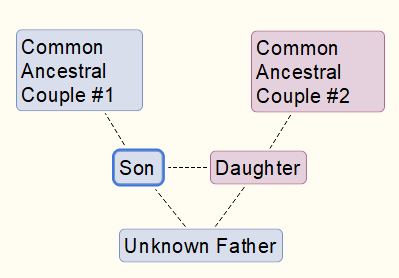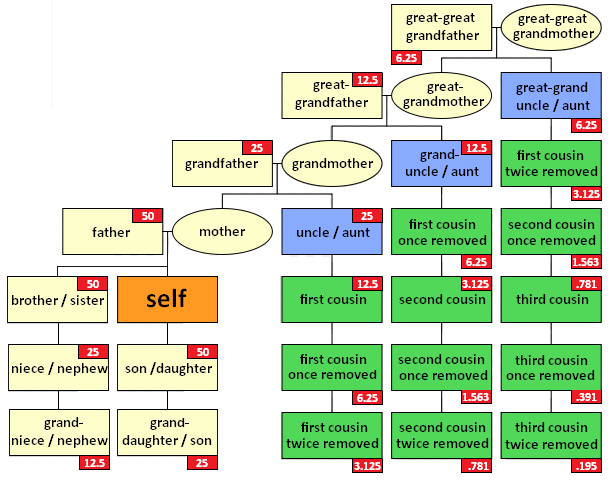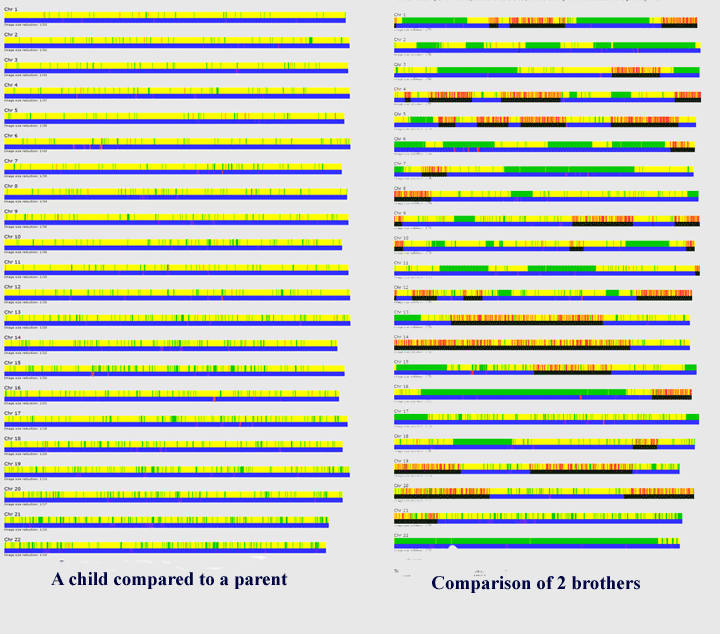Often when I help someone find their biological father with DNA it turns out that he never knew about the pregnancy. His reaction when contacted varies greatly, perhaps his memories of the 60s or 70s are quite faint… Frequently his first question is “How did you find me?” Or “What makes you think it’s me?”
Sometimes my answer is because a close relative of yours tested their DNA and helped us. More often I explain the basic methodology of pedigree triangulation that was used, as follows.
We look at the family trees of 2nd, 3rd, and even 4th cousin DNA matches to see what ancestors they have in common with each other. Sometimes we find two shared ancestral couples, then we look for the son of a person descended from one couple who married a daughter descended from the other couple.
Other times we just find one ancestral couple and some common surnames. We build that couple’s family tree downwards, looking for some of the other surnames we found until we find a descendant who was in the right place at the right time to be the missing father. There are a number of posts here describing specific success stories that are tagged Adoption Success Stories. Click here for my favorite and easy to understand story.
Click here for a more advanced explanation of pedigree triangulation with informative images from DNAadoption.org
Next we ask the found possible father to take a DNA test. To encourage him to use the testing company that his probable child used to confirm the results, rather than a commercial paternity test, I send the following plus more details of how he was found including images of the family trees.
The personal genome tests done by companies like Ancestry.com are remarkably accurate for close relative testing but are not as yet very accurate for ethnicity although they are improving regularly. Ethnicity needs a good pool of people to compare to whereas determining close relatives may only need two or three people.
Some background, all humans are about 99.5% alike in their DNA so these tests look at the base pairs in the genome that are expected to be different between people called SNPs. Although most companies test about 700,000 SNPs that is still a very small percentage of the roughly 3 billion base pairs in a genome. To further confuse the issue, the choice of SNPs changes with each company and the companies’ latest test version (called a chip). This means that sometimes there are only 80,000 or so SNPs in common between tests. That is still enough to determine close relatives and far more than traditional paternity tests use.
One of the reasons for the accuracy on close family matching is that every person gets half their DNA from each parent. Of the 23 pairs of chromosomes, one half of each pair is from Mom and the other from Dad. Each parent passes on DNA that has been mixed up (recombined) from what they got from their parent. So a parent/child relationship is unmistakable in the DNA as the child will always share a full 50% or half their chromosomes with a parent.
Here is an example of chromosome by chromosome comparisons of close family done at GEDmatch.com
The black bars show where there is no match, the blue bars indicate the shared DNA. Note that every single chromosome has a blue bar in the parent/child comparison. The two brothers however do not match on every chromosome but often match on both the maternal and paternal chromosomes, so green bars show where they got identical DNA from each parent.
In the current testing company comparisons a child will share about 3500 cM (centimorgans) with a parent. Centimorgans are how long stretches of identical SNPs are measured. Full siblings will share about 2600 cM and half siblings about 1750 cM, but those can vary more than the parent/child amount. The less close a relationship is, the wider the range of possible shared DNA. See the chart at the following URL for some of those numbers https://dnapainter.com/tools/sharedcmv4

Relationship chart from the ISOGG wiki, courtesy of Dimario, Wikimedia Commons)
Once you get past the immediate family, it gets harder to tell the relationship from the DNA comparisons. Your aunts, uncles, nieces, nephews, grandparents, and half siblings will all share about one fourth of their DNA with you, so telling them apart is done by who else they match and by how much, plus a few other tricks (see my blog post on 25% relationships).
To learn more about DNA testing and matching, you can read many of my articles on this blog. Perhaps start with this very basic one:
https://blog.kittycooper.com/dna-basics/ or look at these presentation slides: https://slides.com/kittycooper/dna-basics#/


Is there anything unethical, or otherwise, about testing a baby for paternity reasons?
Hi Mary Elizabeth,
I’m not an expert here, but have some thoughts: If either parent is known, then consent and ramifications of what may follow need to be discussed, and acknowledged in a written and signed form. I suggest reading Blaine Bettinger’s “Guide to DNA Testing and Genetic Genealogy” chapter 3 on Ethics. It’s only a few pages, but right to the point. Some questions that come to mind are:
1. Who will hold the DNA, who will hold the data. What will be the plan when the child comes of age?
2. Will the unknown parent(s) be notified? This is an important question to answer in advance, and can potentially disrupt lives.
3. What about medical information? Where should the data be stored with that in mind? Will it be offered to the unknown parent? Or unknown siblings?
..Best wishes,
If you’re testing a minor, check the terms of service for the DNA testing company you want to test with. Some have minimum age limits.
I am speaking of home autosomal dna testing, not a paternity test for legal reasons.
Jim,
My daughter and I want to test the new baby of her son and his wife. I would be the 77-year old great grandmother. No need for me to go into the doubtful paternity.
No, my daughter and I would not tell her son, nor anyone else. She and I just want to know if this is “our family baby.” We do not want to disrupt anything.
I would compare the baby’s dna against mine already at MH. I would either be in the baby’s match list or I would not. Uploading to Gedmatch using a one-to-one, we would either match, or not. I already have the MH kit.
Please do not judge me. This would be my first g grandchild and probably the only one considering my age.
Thank you for responding.
Mary Elizabeth –
I understand your feelings but please consider the implications. What happens next? Who do you tell if he is not yours?
If you choose to go ahead, then perhaps check for possible health issues as well.
If you proceed, I would suggest you do not allow matching, you keep the gedmatch kit research and you remove the dna information from online once the comparison is done. put it somewhere safe so you can give it to your greatgrandson when he is old enough to decide what he wants to do with it
Just my opinion
Hi Mary Elizabeth and Kitty,
I’m hoping to be a grandfather some day myself, but am wondering if there is a law regarding testing minors without parental consent? Not being a legal person, I have no idea.
At least ethically I would think you need to get an “OK” from your grandson or his wife before testing their child. (I’m thinking that if my mother or grandparent tested my child without my knowledge I’d be a bit angry – at minimum for not being consulted)
Sorry to seem so negative, it just seems good to ponder these things and be up front before going forward. It would be good form to get a written “OK” from a parent or guardian.
Dear Mary Elizabeth,
Please do not do this. It sounds unethical and dysfunctional and very unfair. You and your daughter maybe caring relatives but you are not the primary guardians for this child. You cite your advancing age as to why you should be able to do this, but please, for the sake of your family dynamic, cast your mind back to what it was like to be the mother of a newborn.
Kitty talks about implications, so let me tell you what happens next, regardless of paternity, the parents find out, because no one will be keeping this secret, and then they go “no contact”.
If paternity is an issue, hire a professional to mediate and sit down with the parents and have an adult conversation. I may sound harsh but what would you rather? An ongoing relationship with your relatives or not.
Oceania, Jim and Kitty,
Thank you for your insightful thoughts. I needed other perspectives; and yes, I am rethinking my original intentions. And, yes, if my grandson found out I had tested his? baby, he would never speak to me.
And, yes, I should mind my own business.
I have a question about children and parents always matching at 50%. What does it mean if they don’t? I do not match my mother fully at 50% and none of my children match me or their father (all the same father) at fully 50%. We’re each close, but not fully.
My match to my mother: 49.8%
Oldest daughter to me: 49.6%
Youngest son: 49.8%
Youngest daughter: 49.7%
My mother and I were both tested by MyHeritage. I also tested with AncestryDNA as did our children(which we then uploaded to MH).
I see lots of other folks matching their parents at the full 50%, but why don’t we?
Thank you.
Suzanne that could easily be because different chips were used for the testing. Any differences of less than 1% can be just noise so do not worry about it.
Thanks, Kitty. I’m not worried about it, just trying to learn all the whys. My oldest daughter figures she’s an alien. haha It has been a very educational 16 months for me since Revelation Day 2018. Thanks for your part in my DNA education since that day. 🙂
Another very useful post…thank you!
Hi I’ve been told I’m 100% someone’s father as they have a 5% DNA 321cM 13 segments match with a first cousin of mine. (They are supposedly second cousins) How can they be so sure? I absolutely have no recollection and none of the information matches up. Thanks
Ted-
Likely there were more DNA tests that led to your family as in the explanation in this article. If you have no brothers who could have been in the right place at the right time then perhaps they are right. Best if you test your DNA at Ancestry or 23andme to confirm or disprove their theory.
You are not the first found father with no recollection of the encounter. Memory is a tricky thing.. see this article for some other stories … https://blog.kittycooper.com/2018/11/not-always-a-happy-ending/